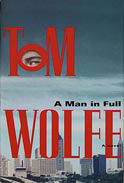A Man in Full
Critique • Quotes
 First edition
First editionFirst publication
1998
Literature form
Novel
Genres
Literary
Writing language
English
Author's country
United States
Length
Approx. 370,000 words
Half full or half empty?
As always, Tom Wolfe's writing shows evidence of an incredible amount of social research. Even a journalist reading this extremely thick novel has to wonder: how did he learn so many details about the Southern real estate and banking industries? how did he pick up all the ins and outs of racial politics in Atlanta? How could he know so much about California prison life? Or about the corporate art scene? Or about any of the other dozen American lifestyles and social circles he bring into A Man in Full? I mean, not in broad strokes but in picayune detail.
Or, more to the point, how does he know enough to be able get inside the heads of the diverse people in those circles?
Charlie Croker, the megalomaniacal real estate mogul whose empire is about to crumble.
His cast-off first wife who feels herself becoming invisible.
The cutthroat bankers who gleefully plot seizing his assets?
Conrad, the young married factory worker, thrown out of work, into jail and into an ancient religion.
Roger Too White, a black lawyer who becomes enmeshed in a black mayor's attempt to exploit a rape case to win re-election.
There's so much here, nearly fulfilling Wolfe's intent to cover the world with this novel. And he gets much deeper into his characters than in his previous novel, The Bonfire of the Vanities. There are moments of not just excitement or plot development—Wolfe's always been good at that, even in his nonfiction—but of genuine pathos.
But there's too much in this book.
D0 we have to know everything?
Wolfe says he discarded most of the eleven-year's work that was intended to go into this book, but there remain long sections of detail that one skims over quickly to get to the good human stuff.
When good ole boy Croker is entertaining urbane liberals (and potential clients who could make or break him) at his plantation, do we have to know every dish served, as well as the history of the place and of every employee there? Do we have to know the nuance of every thought that passes through Charlie's mind? Do we need the entire day's conversation recounted? The characters are drawn well enough and the drama is ripe enough without piling on the minutiae.
The novel is brilliantly plotted though, which keeps you going through all the verbiage and all the swapping of points of view. And it comes together with great consequences for all players.
However, I couldn't help but think it could have come together even better. After the long, careful build-up, Wolfe's resolution, especially regarding Charlie Croker, is rather incredible. The promise of an emotional breakthrough is never fulfilled but is sublimated in a couple of plot twists that avoid working out the issues on an interpersonal level. In the end A Man in Full becomes ironic social commentary.
Which is fine. But it came so close to being more.
— Eric
Critique • Quotes

